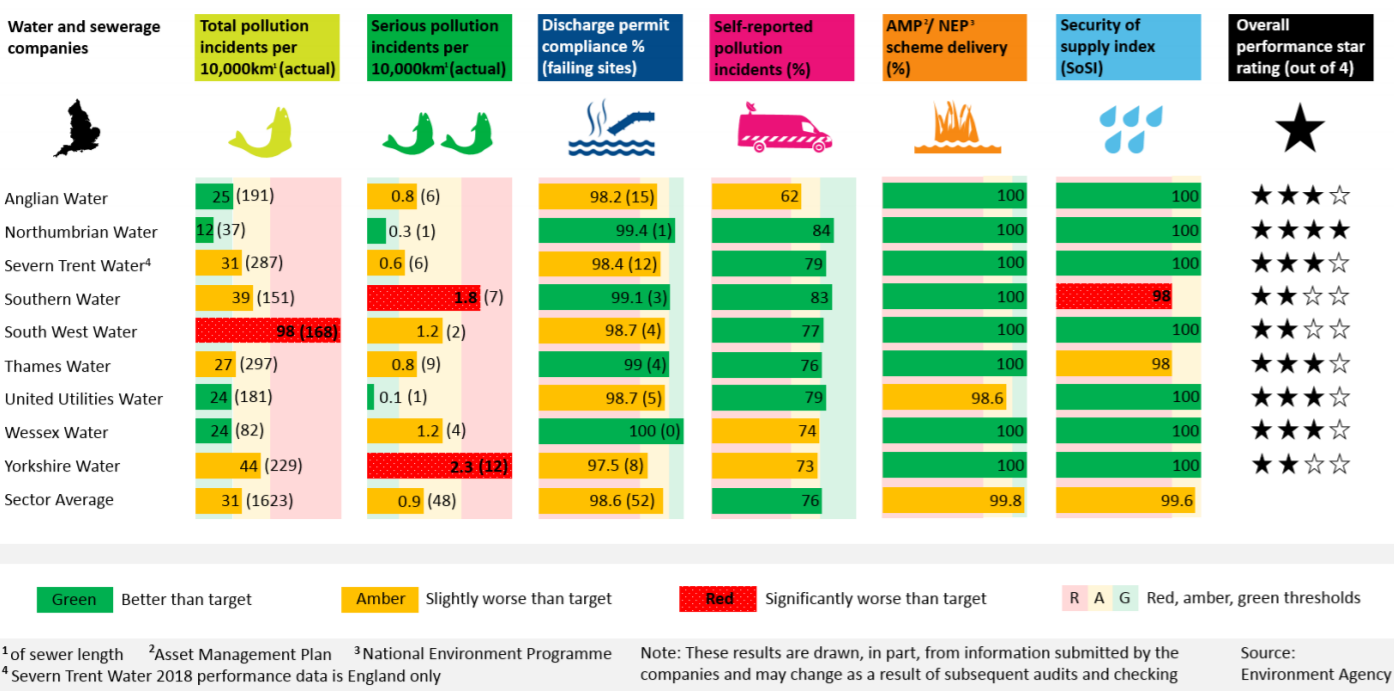Environmental performance of the water and sewerage companies
On 10 July 2019 the Environment Agency (EA) published Environmental performance of the water and sewerage companies, a report suggesting that water companies efforts to protect the environment were ‘simply unacceptable’ with only 1 of them performing at the level expected.
The annual report rates each of the 9 water and sewerage companies in England as green, amber or red on a range of measures including pollution, supply resilience, and complying with permits.
The report reveals that water company performance has deteriorated, reversing the gradual improvement that had been seen in since the rating system began in 2011. Serious pollution incidents have also increased in 2018, causing damage to rivers and wildlife.
Northumbrian Water was the only company to achieve the highest 4 star rating. The EA said this improvement should be applauded and had only been possible with focus from the top of the organisation and ongoing effort from operational teams.
Other findings included:
- Severn Trent Water, United Utilities and Wessex Water dropped from 4 stars to 3 stars.
- Anglian Water and Thames Water remained on 3 stars.
- Southern Water, South West Water and Yorkshire Water were only given 2 stars, described as an ‘unacceptable level of performance.’
- South West Water has consistently demonstrated unacceptable performance and a red rating for pollution incidents.
- Southern Water and Thames Water failed to demonstrate they have robust enough plans to maintain secure water supplies.
- Most water companies look set to fail to meet 2020 pollution targets.
Environment Agency Chair Emma Howard Boyd, said they will continue to work with Ofwat to look at financial penalties to drive better environmental performance and that companies should be reflecting on their environmental performance and long-term resilience - if this is poor they should be asking themselves whether dividends are justifiable.
Executive Director of Operations Dr Toby Willison said: “Water companies need to clean up their act. People expect water companies to improve the environment, not pollute rivers and ensure secure supplies of water. With only one exception, none of the companies are performing at the level we wish to see, the country expects and the environment needs. We will continue to challenge CEOs to improve company performance and we will take strong and appropriate enforcement action. Companies performing well have a positive ripple effect on the natural environment and communities in their regions. We want all water companies to meet the expectation of their customers, the needs of environment and learn from the best practice that the leading company is demonstrating.”
The full report is available at: Environmental performance of the water and sewerage companies.
[edit] Related articles on Designing Buildings Wiki
- 2019 Price review draft determinations for water companies.
- Environment Agency.
- Flood and Water Management Act
- Groundwater control in urban areas.
- Mains water.
- Sustainable water.
- Urban water systems management: A data analytics approach EP 105.
- Water Act 2014.
- Water conservation
- Water consumption
- Water framework directive.
- Water Industry Act 1991.
- Water investment.
- Water quality.
- Water.
Featured articles and news
The need for a National construction careers campaign
Highlighted by CIOB to cut unemployment, reduce skills gap and deliver on housing and infrastructure ambitions.
AI-Driven automation; reducing time, enhancing compliance
Sustainability; not just compliance but rethinking design, material selection, and the supply chains to support them.
Climate Resilience and Adaptation In the Built Environment
New CIOB Technical Information Sheet by Colin Booth, Professor of Smart and Sustainable Infrastructure.
Turning Enquiries into Profitable Construction Projects
Founder of Develop Coaching and author of Building Your Future; Greg Wilkes shares his insights.
IHBC Signpost: Poetry from concrete
Scotland’s fascinating historic concrete and brutalist architecture with the Engine Shed.
Demonstrating that apprenticeships work for business, people and Scotland’s economy.
Scottish parents prioritise construction and apprenticeships
CIOB data released for Scottish Apprenticeship Week shows construction as top potential career path.
From a Green to a White Paper and the proposal of a General Safety Requirement for construction products.
Creativity, conservation and craft at Barley Studio. Book review.
The challenge as PFI agreements come to an end
How construction deals with inherited assets built under long-term contracts.
Skills plan for engineering and building services
Comprehensive industry report highlights persistent skills challenges across the sector.
Choosing the right design team for a D&B Contract
An architect explains the nature and needs of working within this common procurement route.
Statement from the Interim Chief Construction Advisor
Thouria Istephan; Architect and inquiry panel member outlines ongoing work, priorities and next steps.
The 2025 draft NPPF in brief with indicative responses
Local verses National and suitable verses sustainable: Consultation open for just over one week.
Increased vigilance on VAT Domestic Reverse Charge
HMRC bearing down with increasing force on construction consultant says.
Call for greater recognition of professional standards
Chartered bodies representing more than 1.5 million individuals have written to the UK Government.






















